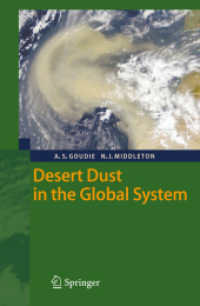- ホーム
- > 洋書
- > 英文書
- > Business / Economics
Full Description
Creating Knowledge over Distance shows that economic knowledge creation fundamentally depends on, benefits from, and is structured by temporary geographical proximity - that is, by economic actors meeting in person or interacting in a co-present context to discuss business opportunities, problems and solutions are face to face.
During the Covid-19 pandemic, personal meetings often had to be reduced or were replaced by virtual meetings, leading many observers to assume a fundamental reconfiguration of economic life in the future as face-to-face interaction may be substituted by virtual interaction through the use of new information and communication technologies. While communication patterns certainly changed during this period, this book demonstrates that the face-to-face meetings the authors investigate across a sequence of 11 chapters with different knowledge-creation contexts are unlikely to be fully substituted by distant interactions - and may even become more important over time. The book develops the argument by systematically analyzing three configurations of knowledge transfers over distance: (1) international community gatherings, such as trade fairs, delegation travel, conventions and conferences, (2) mobile business practices, including intra-firm business coordination, inter-firm projects, producer-user meetings, and corporate expansions/inter-firm negotiations, as well as (3) transnational networks, related to transnational corporations and transnational migrant firms (including new transnational firms/new Argonauts and transnational family networks).
Contents
List of Figures
List of Tables
Conceptualizing Knowledge Creation Over Distance
1: Making Global Connections: Combining Temporary and Permanent Spatial Settings
2: Configurations of Knowledge Creation over Distance
Part II. Knowledge Creation in International Community Gatherings
3: International Trade Fairs
4: Business Conferences and Conventions
Part III. Knowledge Creation Through Mobile Business Practices
5: Intra-firm Business Coordination
6: Producer-User Interaction and Inter-firm Projects
7: Corporate Expansion and Inter-firm Negotiations
Part IV. Knowledge Creation in Transnational Networks
8: Transnational Corporate Networks
9: Transnational Migrant Firms and Entrepreneurs
Part V. Knowledge Creation in Virtual and Temporary Proximity
10: Practices of Virtual Economic Interaction
11: Synthesis: Towards Integrated Global Geographies of Knowledge Creation
References
Index








